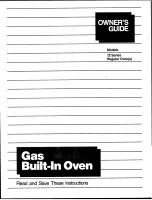
Tested for you in our cooking studio
en
29
dependent on the type, moisture, ripeness and
thickness of the food. The longer you leave the food to
be dried, the better it will be preserved. The more thinly
you slice the food, the more quickly it will dry and the
more flavour it will retain.For this reason, the table
specifies setting ranges.
If you wish to dry food that is not listed in the table, you
should use the settings listed in the table for similar
food as reference.
Prove dough
Your yeast dough will prove considerably more quickly
using this heating function than at room temperature
and will not dry out. Do not start the appliance if the
cooking compartment is not completely cool.
Always allow yeast dough to prove twice.Use the
settings indicated in the settings tables for the first and
second proving stages (dough fermentation stage and
final fermentation stage).
Dough fermentation
Place the dough into a heat-resistant bowl and place
this onto the wire rack. Use the settings indicated in the
table.
Do not open the appliance door while the dough is
proving, otherwise moisture will escape. Do not cover
the dough.
Condensation builds up during the proving process,
which steams up the door panel. Wipe out the cooking
compartment after dough proving.Remove any
limescale with a little vinegar and wipe with clean water.
Final fermentation
Place your dough into the oven at the shelf position
indicated in the table.
If you want to preheat the oven, the final fermentation
stage takes place outside the appliance in a warm
place.
The temperature and proving time are dependent on
the type and quantity of the ingredients. For this reason,
the values indicated in the settings table are intended
as a guide only.
Defrosting
For defrosting frozen fruit, vegetables and baked items.
Poultry, meat and fish should ideally be defrosted in the
refrigerator. Not suitable for cream cakes or cream
gateaux.
Use the following shelf positions when defrosting:
■
1 wire rack: Position 2
■
2 wire racks: Positions 3 + 1
Tip:
Food that has been frozen flat or in portions
defrosts more quickly than food items frozen in a block.
Remove frozen food from its packaging and place it
onto the wire rack in suitable cookware.
Redistribute the food or turn it once or twice as it
defrosts. Large pieces of food should be turned several
times.As the food defrosts, break up any clumps and
remove items that have already defrosted from the
appliance.
To allow the temperature to equalise, leave the
defrosted food to rest for another 10 to 30 minutes in
the appliance after switching it off.
Fruit, vegetables and herbs
Accessories
Heating
function
Temperature in
°C
Cooking time in
hours
Pomes (apple rings, 3 mm thick, 200 g per wire rack)
1-2 wire racks
<
80
4-8
Root vegetables (carrots), grated, blanched
1-2 wire racks
<
80
4-7
Sliced mushrooms
1-2 wire racks
<
80
5-8
Herbs, washed
1-2 wire racks
<
60
2-5
Dish
Accessories/cookware
Shelf posi-
tion
Heating
function
Step
Temperature
in °C
Cooking
time in
mins
Yeast dough, light
Bowl
2
%
1.
-*
25-30
Universal pan or loaf tin
2
%
2.
-*
10-20
Yeast dough, heavy and rich
Bowl
2
%
1.
-*
60-75
Universal pan or loaf tin
2
%
2.
-*
45-60
* Heat up up to 50 °C with
%
Frozen food
Accessories
Position
Heating
function
Temperature
For example cream gateaux, buttercream cakes, gateaux with chocolate
or sugar icing, fruit, chicken, sausage and meat, bread and bread rolls,
cakes and other baked items
Wire rack
2
B
The temperature selector must
remain in the "Off" position
Содержание HBF113B 0I Series
Страница 1: ... en Instruction manual Oven HBF113B 0I HBF113BR0M ...
Страница 2: ......
Страница 30: ...en Tested for you in our cooking studio 30 ...
Страница 31: ...Tested for you in our cooking studio en 31 ...




































